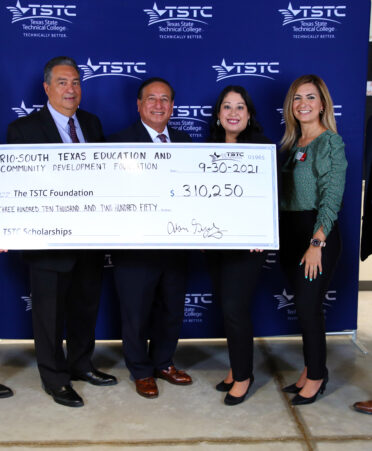(HARLINGEN, Texas) – Leaders from Texas State Technical College and the Rio-South Texas Education and Community Development Foundation Inc. (RSTEF) gathered Thursday, Sept. 30, at TSTC’s Harlingen campus to celebrate a $310,250 grant to The TSTC Foundation for TSTC’s Biomedical Equipment Technology program and The TSTC Foundation’s Goal Line Assistance Scholarship.
The RSTEF has pledged $210,250 to purchase new training equipment for TSTC’s Biomedical Equipment Technology program, as well as $100,000 to be used for The TSTC Foundation’s Goal Line Assistance Scholarship designed to aid students who may be facing financial difficulties during their final year at TSTC.
Richard Mesquias Jr., TSTC’s senior field development officer, said this is a pivotal moment for Biomedical Equipment Technology at TSTC.
“The program’s new strategic push to advance into Medical Internet of Things (MIoT) industry 4.0 is making it possible for machines to be connected to a network that can monitor patients from a distance,” he said. “The MIoT brings together physical objects with embedded electronics, software, sensors and network connectivity so that they are able to collect and exchange data with each other. By its very nature, biomedical equipment technology bridges medicine, engineering and the basic sciences while addressing some of the most daunting health issues of our time.”
Matt Ruszczak, RSTEF’s vice president of economic development, added that this opportunity will allow students to attend a program that is geared toward occupations that are in demand in the Rio Grande Valley.
“We hope this contribution will build up a successful, well-educated and strong workforce in our region,” he said.
Amanda Posada, TSTC’s interim Harlingen campus provost and statewide dual enrollment executive director, said technical education is special because it offers a more accelerated, expedited learning.
“Students have the opportunity to enter fields like biomedical equipment technology, mechatronics and other areas where they can achieve a certificate or an associate degree to enter the workforce early,” she said.
The resources that TSTC receives from donors helps to provide up-to-date tools and technology for training TSTC students. It is a meaningful impact that offers long-term outcomes.
Cledia Hernandez, TSTC’s associate vice chancellor for External Relations and Workforce Development, explained that TSTC always tries to maintain relevance to industry demand.
“These dollars are life-changing to every one of our students because we are investing in them and our community is investing in them,” she said.
David Sanchez, a TSTC Biomedical Equipment Technology instructor, said the equipment provided by the grant will give the students great exposure and in-depth troubleshooting skills to work with those types of machines in hospitals, clinics and other areas.
“This grant is beneficial long-term because our students will be using the same equipment that’s out there in the field,” he said. “In the beginning, students are learning how to utilize a basic tool set, power tools and other components. They begin their internship or clinicals by their fifth semester and fix those machines at a hospital setting.”
The future for TSTC Biomedical Equipment Technology students is promising. Not only will this donation allow their program to shine, but graduates will be able to provide a good quality of life for their families and give back to the community.
For information about giving to The TSTC Foundation, visit tstcfoundation.com.
For more information about TSTC, visit tstc.edu.
